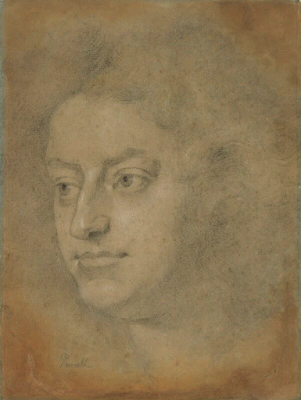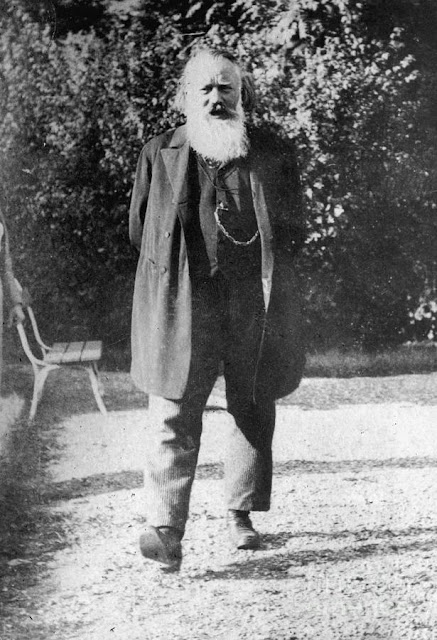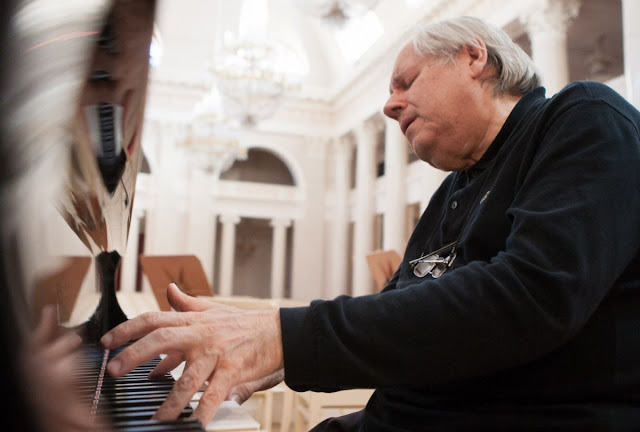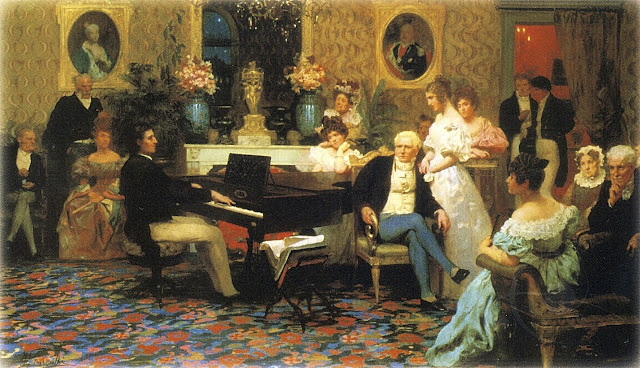Grigory Sokolov Recital - Warsaw 27th November 2022 - "Cease, anxious world, your fruitless pain" (1687) Song by Henry Purcell
"Cease, anxious world, your fruitless pain" (1687)
Henry Purcell Song Z 362
If one was fortunate
enough to be present at the recent Warsaw recital by the great pianist Grigory
Sokolov, one is taken unresisting through deep valleys and alpine pastures of
music. It is an inspired voyage within a timeless musical landscape of immense
variety and scope. Tonight we passed
through two centuries of musical inspiration of the highest order and guidance. Certainly historically we are presently in
dire need of reminders of the creative and beautiful rather than the destructive,
brutal and ugly in human nature. We need daily to summon up the courage
required to face current human adversities of many types and complexions, most
of them deeply tragic.
The recital was
therapeutic and uplifting in its way. His playing expresses the deepest
humanism, creativity and maturity in conceiving an appropriate profundity of
musical interpretation, a direct metaphysical connection to the spirit,
inspiration even redemption offered by the spirit of the composer. Such
plumbing of the bottomless well of expression continues to evolve over time in
a great artist such as Sokolov. Such a transformation can only unfold after
overcoming obstacles both personal and musical through endless work on his art.
Indiscriminate Nature seeks daily to mercilessly project upon humanity many
spiritual and physical reversals. We are privileged listeners to his evolution
and confession.
In what one
might refer to as the 'autumnal Sokolov' or these days of his 'mahogany maturity',
I am no longer carried away on a tsunami of youthful virtuosity, keyboard
pyrotechnics and all too familiar gestures of interpretation. In the words of
the great English poet William Wordsworth (1770-1850) from his Preface
to the Lyrical Ballads of 1802 :
‘Poetry
takes its origin from emotions recollected in tranquility...'
During this
pause for thinking, my often tumultuous emotions when listening to Sokolov have
matured somewhat and I write the following appraisal of his
programme. With any great artist of this stature, one must never succumb
to superficial assessments. This predisposition is all too common in our social
media dominated world of trite generalizations, infantile cartoon figures and
adoration of sensation at the expense of serious analytical thought - the all
too common present retreat from the intellect.
The English composer William Boyce (1711-1779) wrote of Henry Purcell :
"The Poet Dryden wrote an
Elegy on his Death, which was set to Music by Dr. John Blow, who had been his
Master. He appears to have possessed a Genius superior to any of his
Predecessors, together with a depth of Musical Knowledge not inferior to the
most learned of them. His Talents were not confined to any particular Manner or
Stile of Composition, for he was equally excellent in every thing he attempted;
and it is doing but common Justice to his Memory to acknowledge, that his
Works, in general, affect more powerfully, than those of almost any other
Author."
I found it astonishing that the entire first half of Sokolov's recital programme was devoted to a selection of keyboard works by the Orpheus Britannicus, Henry Purcell. Half his recital! I was put in mind of another remarkable recital he gave in Warsaw of the haunting Baroque works of Johann Jakob Froberger (1616-1667). Not to mention the delightful François Couperin (1668-1733) selection to which he treated us, the ambiance of the imagined pleasures of a fête galante aesthetically created.
As I live in Warsaw, I have become rather acutely aware of the relative contemporary neglect on the European continent of significant English music from the golden age of the Elizabethan Virginalists, the English Baroque of the 17th century, through delightful 18th century Bath and the pleasure gardens of Vauxhall and Ranelagh in London up to say to the mid 19th century. Here were the likes of Henry Purcell, John Blow, John Bull, John Dowland, Orlando Gibbons, William Byrd, William Boyce, William Croft, Charles and Samuel Wesley, Thomas Arne, Charles Avison and William Sterndale Bennett. In fact, in a 1940 interview, the great pianist and musician Ignaz Friedman stated that he considered Purcell as great as Bach and Beethoven.
 |
| Henry Purcell (1659-1695) by John Closterman (1695) NPG |
Purcell was a miraculously fecund composer who died tragically young at thirty-six. Most informed music lovers would be familiar with the first English true glorious opera Dido & Aeneas, his incidental pieces for the theatre (over forty London stage productions), his 'half-operas' (dramatic speech and music) such as Diocletian, The Fairy Queen, The Indian Queen and King Arthur, the anthems, the welcome and birthday odes, Royal funeral music, the remarkable string fantasies, the hundreds of songs and trio sonatas. His limited formal range of keyboard works (but not in expressiveness) are perhaps understandably neglected, more especially by pianists who may even have already courageously ventured into harpsichord territory, strongly occupied by the Bachs, the Couperins and Rameau.
 |
Garton Orme
at the Spinet
|
Jonathan Richardson the Elder (1667–1745) The Holburne Museum |
Purcell included little of his own in the anthology Musick's Hand-Maid that he edited for his friend John Playford in 1689. The keyboard music and eight suites (of which some were performed this evening) he included in A Choice Collection of Lessons for the Harpsichord or Spinnet were actually not printed until 1696, a year following his death. He was an extremely busy musician at Court (Composer-in-ordinary from 1677 and organist at the Chapel Royal from 1683) with in addition many instrument maintenance duties unrelated to the demanding composition of music for the manifold Court festivities.
Listeners can be somewhat disappointed by the relatively lightweight nature and texture of his suites in comparison with the dense harmonic, contrapuntal and fugal writing of say Bach, Handel or François Couperin. Rather than grand effects and bravura writing, we have perfect simplicity.
There are elements of Italian and French harpsichord writing (Chambonnières) and aspects of free improvisation in his Preludes as was common in the music of Louis Couperin and d'Anglebert. However, one is always aware of the unique, individual voice of Purcell and his characteristically English mannerisms, English Baroque 'eccentricities' and his passion as well as his wit and humour in the Jigs and Hornpipes. I am reminded of Elizabethan miniatures in portrait art by say Nicholas Hilliard (1547-1619) or Isaac Oliver (1556-1617) - small in scale but containing entire worlds within.
Purcell would probably have
intended these works for modest domestic entertainment and teaching purposes.
He had at least one aristocratic pupil, Lady Katherine Howard, to whom his wife
dedicated a collection of songs after his death.
As many of you will know, I studied the piano and harpsichord seriously in London for a number of years and play the Purcell works in this programme (In 1978 I commissioned a David Rubio copy of a Joannes Daniel Dulcken Flemish instrument of 1745).
In order to perform this music on the piano as he did so convincingly, Sokolov would have had to familiarize himself with the complex historical performance practice of the English Baroque period - Baroque phrasing, unconventional fingering, varied articulation, notes inégales, imaginative pedalling (if any) and the accurate realization of many complex, crisp ornaments integrated into the melodic line and finally the improvisations implied by the Preludes, to mention just a few aspects. This transition is no mean feat on the piano. His beautiful tone and refined touch are infinitely flexible and matched or rather creatively transformed into what might be expected from a seventeenth century plucked instrument.
I cannot describe each movement in detail save that his approach to every piece indicated he understood the correct tempo (the selection of which Purcell himself observed was the most difficult aspect of musical performance) and the nature and character of the dances. For example the Saraband in the time of Purcell was rather faster and more energetic than we conceive of the more reflective, internalized Bach Sarabande today. These differences Sokolov expressively and carefully observed.
The Irish and Scotch folkloric tunes were such a welcome, light-hearted relief from the deeper speculative, even debilitating thoughts of war, torture and suffering that besiege us presently when listening to more serious, philosophical music. He gave an affecting, fine interpretation of the Suite No.4 in A-minor Z 663 (1696) with an eloquent Prelude, Almand and Saraband. The Suite No.7 in D minor, Z. 668 (1696) has a ravishingly complex Allemand in the English Baroque idiom. Sokolov heightened the transparent polyphony with sensitivity and refinement. The Hornpipe was a distinct reminder of happier days, as civilized humanity raised its beautiful head. The Chaconne in G minor ZT 680 was also a keyboard delight under the deft Sokolov fingers. To devote half a recital to this much underrated and under-performed English music is surely a great expression of musical courage, optimism and achievement.
Henry Purcell (1659–1695)
A selection of harpsichord pieces in a piano arrangement
Ground in G major, Z. 645
Suite No. 2 in G minor, Z. 661 (1696)
Prelude
[Almand]
Corant
Saraband
A New Scotch Tune in G major, Z. 655
(1687)
Trumpet Tune in C major “Cibell”, ZT 678
(1696)
Suite No. 4 in A minor, Z. 663 (1696)
Prelude
Almand
Corante
Saraband
Round O in D minor, ZT 684
Suite No. 7 in D minor, Z. 668 (1696)
Almand
Corant
Hornpipe
Chaconne in G minor, ZT 680
An expressive, spirited, witty and arguably the best performance of Purcell's keyboard works on the harpsichord is available on Harmonia Mundi (HMU 907428) CD performed by Richard Egarr.
He plays an evocative sounding and period appropriate harpsichord by Joel Katzman of Amsterdam copied after Ruckers Antwerp 1638
Pitch = 392 and meantone temperament
Intermission
Some twelve
days after writing the tragic lament contained in the Heligenstadt
Testament of 1802, Beethoven wrote to his publisher of two
sets of variations, Op. 34 and Op.35:
“I have
composed two sets of variations, one consisting of eight variations and the
other of thirty. Both sets are worked out in quite a new manner, and each in a
separate and different way. . . . Usually I have to wait for other people to
tell me when I have new ideas, because I never know this myself. But this
time—I myself can assure you that in both these works the method is quite new
so far as I am concerned.”
Beethoven, during the classical period, transformed into an immense drama the fugue and variation forms we are accustomed to hearing in Haydn and Mozart, containing as they do the shadows of the Baroque. The variation form, under the influence of his fiery imagination, metamorphosed into the dramatic sonata style. Beethoven concentrates on one theme, in this case, his favourite was also used in the Eroica Symphony in E-flat major Op.55 and the ballet The Creatures of Prometheus Op.43 (the theme possibly originated by Muzio Clementi).
In this magnificent work, Sokolov in his maturity, approached it in rather a slower and more considered tempo to that which we are accustomed to hearing, less virtuosically declamatory. I remember hearing an unforgettable, overwhelmingly tempestuous performance by Emil Gilels in the Royal Festival Hall in London many years ago.
But this vision was not a similar tsunami of sound and intensity. One could hear, become aware of, Beethoven exploring the inner essence of this theme through the variation form. Often one is rather listening to the variations being transformed 'from on top' as it were, rather than from deep within as Sokolov achieves. At times this inner life was explored within the composition itself through the separation of the bass and treble lines of the theme.
Sokolov made much play (sometimes broadly humorous as was Beethoven's wont) of the prominent bass line. He gave each variation a character of its own, a destiny to fulfill. He rendered the Finale (alla Fuga): Allegro con brio theatrically, absolutely brilliantly in the fugue through breathtaking trills and a fulsome da capo return. The performance was highly impactful in the unique and spell-binding manner I am sure Beethoven intended.
Ludwig van Beethoven (1770–1827)
15 Variations and Fugue in E flat major, Op. 35 (1802)
Introduzione col Basso del Thema: Allegretto vivace
Tema
Variazione I
Variazione II
Variazione III
Variazione IV
Variazione V
Variazione VI
Variazione VII: Canone all’ottava
Variazione VIII
Variazione IX
Variazione X
Variazione XI
Variazione XII
Variazione XIII
Variazione XIV (minore)
Variazione XV: Largo (maggiore). Attacca Coda
Finale (alla Fuga): Allegro con brio
Johannes Brahms (1833–1897)
No. 1 in E flat major: Andante moderato
No. 2 in B minor: Andante non troppo e con molto
espressione
No. 3 in C sharp minor: Andante con moto
Sokolov ended his recital with the profoundly personal, lyrical tenderness of the Brahms Intermezzi Op.117, a work unsurpassed in the expression of profound sadness and dejection. This set of passionate musical denials and sacrifices was composed in 1892. In this recital, how far we have traversed and managed to release the expression of personal emotions in the two hundred years between Purcell and Brahms. Sokolov had somehow magically adapted his sound to suit each composer he encountered on this rare evening.
The Intermezzi are
intensely poetic and introspective works which Brahms thought of as 'three
lullabies for my sorrows.' Sokolov brought forward to our attention a Scottish connection not previously considered. The first Intermezzo in
E-flat major has a preface written on the score taken from an old
Scottish ballad, Lady Anne Bothwell's Lament:
'Sleep softly, my child, sleep
softly and deep!
How much it hurts to see you
weep!'
The second in B-flat minor embraces a transcendental, almost metaphysical mood with its flowing line. The third in C-sharp minor is thought to be inspired by Gottfried von Herder’s poetic lines 'Oh woe! Oh woe, deep in the valley…' with its rather angular yet mysteriously rich atmosphere. When Brahms unsurprisingly sent this set of Intermezzi to Clara Schumann, she wrote 'In these pieces I at last feel musical life stir once again in my soul.'
The Sokolov performance was a poignantly moving and deeply affecting experience
dredged from the deepest heart and soul of painful reminiscence, regret and yet followed by sublime resignation.
Tumultuous
applause and shouts followed that seemed somewhat inappropriate in these melancholic yet calm circumstances
of recollection. We had been taken deep inside these works to explore their innermost poetry and lyric power. Emotionally only silence can ensue.
As encores I felt that he perhaps chose as a protest and also a commemoration in this anniversary year, works with a proper expression of dissenting anger, rage and melancholy horror at the murderous war in Ukraine. The performance of Russian music and also recitals by Russian musicians has forbidden in many areas of classical music in Poland at present.
He opened his cycle of encores
with four Preludes by Rachmaninoff
Op.28 (Nos. 2, 4, 9 and 10). A superior performance
to last year, perhaps galvanized and driven by further heated emotions. Then the
Chopin Mazurka in A-minor Op. 68 No. 2, played unusually slowly, internally absorbed and reflectively envisioned which rendered it particularly nostalgic and disconsolate. His
final encore (of the usual generous six) was the Siloti/Bach Prelude
in B minor.
I went to the green room to shake his inspired palm and once again bathed in the sunshine of his glorious smile, enough wattage to light up a ballroom. A great musical privilege is given us to hear this artist.
I again wandered out of the Philharmonic into a freezing November night in wintry Warsaw. I fell into a dreamlike reverie on the dark, wet pavements as always. In this autumnal glow of a majestic musical career, Sokolov surely must be approached with similarly mature and considered critical criteria to that which he showed us in performance. That is of course if you have the temerity to apply criticism to such a paramount musical artist rather than simply noting personal interpretative differences concerning the conception of any great musical work.
The other evening I watched the unsettling monumental performance of Uncle Vanya by Anton Chekov. I could not help reflecting how much more this immortal play means to me now in my own maturity than when I first saw it whilst at university in my early twenties, so many years ago. I feel this must be how Sokolov approaches his vast repertoire, coming to it now with maturity and the inevitable accumulation of joyful and melancholic experience through the inevitable passing of years. In recital one always feels he becomes a conduit for the spirit of the composer. One feels so affectingly, that full creation, not sterile reproduction, always takes place in the hall with him, that he gives us this spirit of the composer generously without let or hindrance, directly from his heart and mind. He fills the room with a rare charismatic almost metaphysical radiance.
The spontaneity of fire in
the crucible of musical recreation continues, but possibly slightly different in conception
now, one dimension deeper. We have moved beyond the overt intensity of exuberant youthful temperatures and plumbed
far more profound musical worlds with the warmth and wisdom of mature penetration. We are invited to absorb the more discerning satisfactions that lie beyond youth and the glory of it.











Beautiful commentary. Thank You 🙏 .
ReplyDelete